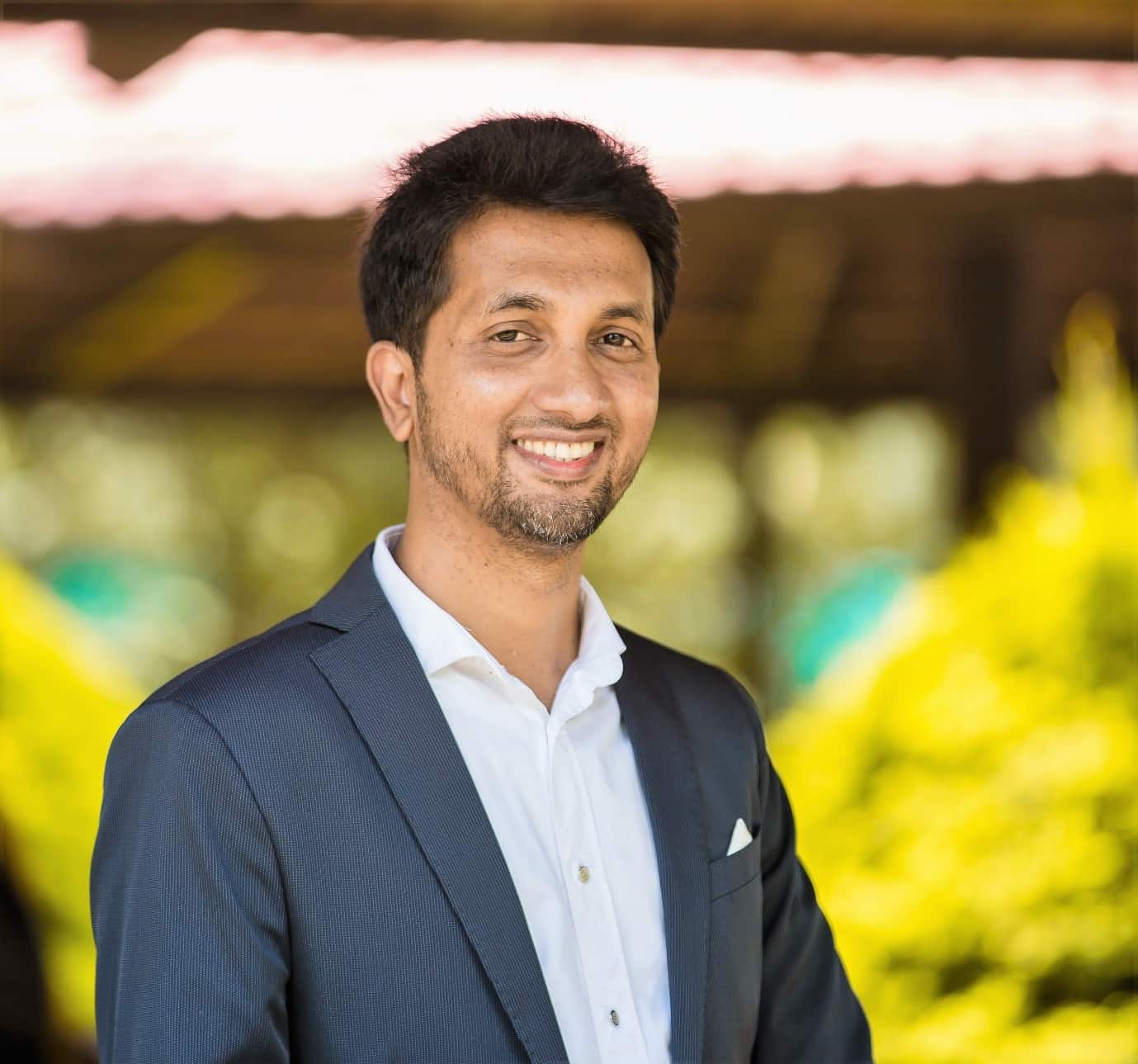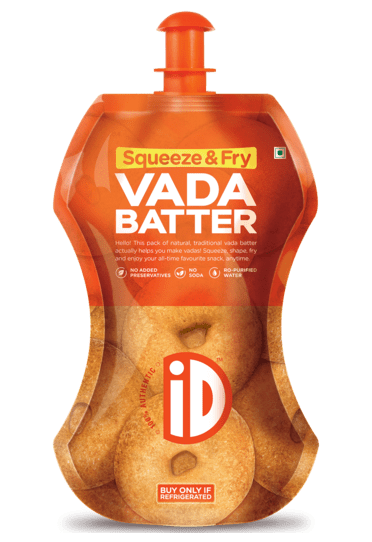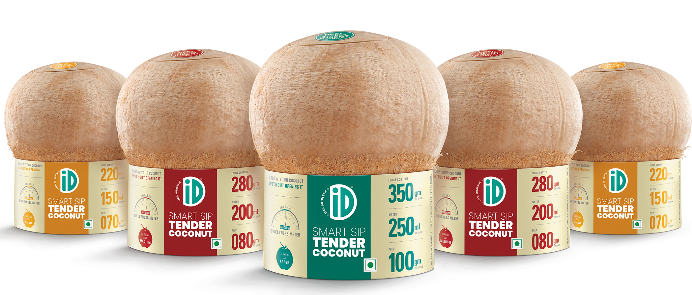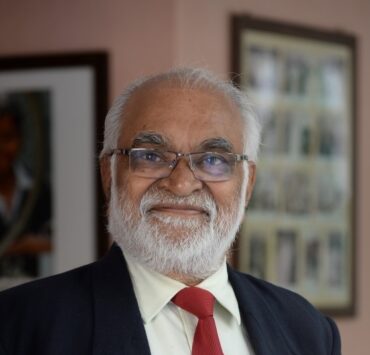THE BATTER MAN

The story of P.C. Musthafa has a rather comprehensive entrepreneurial narrative, apart from the sensational rags-to-riches flavour. It has all the elements of goodness generally existing around us that often offer a helping hand to prevent some from drowning – an enabling environment comprising a teacher who wouldn’t let you drop out of school because you failed a grade, parents who instill in us strong values in spite of their extreme difficulties, remarkable institutions where one can enter on merit and study amidst a diverse peer group, and most importantly, the freedom to think and do things that you want to do unfettered.
Thus, instead of ending up as a daily wage worker like his father, Musthafa could reach the doorsteps of a premier engineering school. The rest is mostly to his own credit that he managed to study well and get into the Indian Institute of Management – Bangalore, get employed in multi-national companies and so on. Needless to say, the village school where he studied and these premier institutions that shaped him to be a world-class entrepreneur later, were indeed part of the fundamental steps of creating that enabling environment.
Now, Musthafa, the cofounder and CEO of the Bangalore based iD Fresh Food, is a celebrity young entrepreneur, at the helm of a USD 250 million company. In his childhood, having breakfast was a luxury, and three meals a day was a distant dream. Now, iD Fresh Food is a leading ready-to-cook and packaged food company serving several cities in India and abroad.
There is hardly any print and digital media, within and outside India, that has not covered their story. Musthafa gave a talk at Harvard, and has addressed UN officials at its headquarters in New York. This article is not a rerun of his success story. After having researched a bit about iD Fresh Food and the man behind it carefully, we raised some tough questions to Musthafa. What we now hear from the horse’s mouth is a reflection of his urge to give back, and to be responsible to the society that fostered him.
LD: Your cousins in grocery business not getting good batter was certainly a trigger for venturing into the batter business. But if you introspect now, in spite of being a tech and management graduate, what really made you not to attempt an IT business that didn’t even require the kind of capital you needed to start iD Fresh Food? Bangalore was also a hotspot for IT start-ups.
PCM: When I look back, I can see that I always had an entrepreneurial mindset. Even as a child, I was always trying to find viable solutions to the many problems we were facing. One of the biggest issues was cash crunch. My father was a daily wage worker in a remote village in Kerala, which had neither electricity nor roads, and getting food on the table for the family was a challenge.
I remember how I had set up a makeshift shop, when I was barely ten years, selling chocolates in front of my house. I walked about 15 km to the nearest town to get the chocolates, and sold them at a decent profit margin. In a couple of months, I bought a goat and then cows. My sisters took care of the animals, while I sold the milk.
So, to answer your question, starting iD was not really a calculated business move. My cousins – Abdul Nasser, Shamsudeen, Jaffer and Naushad – and I got into it because we saw a genuine need for the product. Idli and dosa1 batters were being sold in unhygienic plastic covers sealed with rubber bands. We came up with our flagship idli and dosa batter in a boat-shaped, hygienic and reusable packaging.
We were driven by innovation, to do something that adds value to the society and makes a net positive impact on the world. And what can be better than healthy, preservative-free, traditional Indian food?
What started in 2005 as a modest business with an investment of about USD 1000, in a 50 sq. ft kitchen, with one grinder, a mixer, a weighing machine, a sealing machine and a second-hand scooter (for delivery), has grown today to become the largest fresh food brand in India. I think that has been possible only because we did it with 100% honesty; our intentions were good.

“Before we expect our customers to trust us, we trust our customers, because trust begets trust”
LD: If you look around, most developed countries are trying all what they can do, including through the so-called Innovator Visas and start-up pitches, to attract start-ups in AI, Machine Learning, AR, VR, data sciences and so on. It looks as if many other businesses do not even count to be looked at for possible innovations. What is your take on this kind of approach, given your phenomenal success with a very mundane product?
PCM: I don’t think any of our products are ‘mundane’! We take pride in making our food without the use of any chemicals, preservatives, synthetic stabilisers, artificial colours, or flavours. It is all natural and made in ‘giant home kitchens’ – not laboratories – that follow the best-in-class manufacturing processes, using state-of-the-art equipment.
At iD, all our innovations have been powered by common sense; technology is actually just a tool. While we are excited about the prospect of harnessing the power of AI, ML, AR, VR and all other state-of-the-art technologies, that is never the goal. It is the means to an end.

We are trying to understand people and solve their problems. If you look at our patented squeeze-and-fry vada2 packaging design, it blends the complex art of traditional vada making with the simple science of modern technology. We wanted people to enjoy crispy vadas at home. Why should you have to go to or order from a restaurant?
With all iD products, our aim is to offer healthy and fresh traditional Indian food choices that rank high on convenience and smart packaging.
LD: We have understood that your entire supply chain and therefore production too are highly IT-enabled and automated. Therefore, we do not question the need for rapid technological advancements on its own. But for a vast majority of the world population, even their basic needs – food, clothing, shelter and healthcare still remain unmet. Do you feel that you are more on the nobler side of the business and engagement with the society? Or, is there an urgent need for the world to strike a balance between fostering ‘conspicuous consumption’ (and related sustainability issues) and offering essential quality of life?
PCM: I see entrepreneurship as a powerful tool for social change. One of the principal reasons I became an entrepreneur was to give back to the society. Despite my underprivileged socio-economic background, I have been fortunate to have the kind of opportunities that I have had!
My struggles have motivated me to do well in life. Thanks to my dedicated teachers at school, I managed to complete my schooling. I actually topped my school and did engineering in Computer Science from NIT-Calicut and MBA from IIM-Bangalore.
Today, when I am invited to share my success story at esteemed platforms, such as the Harvard Business School, MIT-Sloan and the United Nations, it drives me to provide more opportunities for millions of aspirants from humble socio-economic backgrounds.
As entrepreneurs, I believe, we have a social responsibility to address the issues that plague our societies. In fact, one of the biggest reasons I got into the food business was to address the concern of access to healthy food. At iD Fresh, we innovated heavy-duty machines to mass produce idli in a very cost-effective way.
Given that this South Indian staple is considered one of the most nutritious foods in the world, making it affordable and accessible could very well be a suitable solution to the hunger problem. It is heartening to know that our zero-inventory business model, selling 100% natural and fresh food, is already helping millions of Indians to beat malnutrition.
As far as striking a balance between ‘conspicuous consumption’ and offering essential quality of life is concerned, I think we all have an inherent responsibility towards the Earth, and to each other. Technological progress doesn’t have to come at the cost of environmental harm. To get ahead in life, we don’t need to put others down. In fact, growth is more meaningful when the whole community is part of the process. Together everybody achieves more!
LD: We have found you emphasizing on certain business ethics and values that you are not ready to compromise, one of which is not to depend on borrowed funds by paying interest. When corporate finance largely revolves around leveraging on borrowed money, how do you manage the rapid expansion and growth for your business? Is there any model that you can offer to the budding entrepreneurs?
PCM: Ethics and values are the foundation of life. I believe they should be an integral part of business too. Over the last fifteen years, we have walked away from industry opportunities that didn’t align with our ethics and lucrative buyout offers, despite market upheavals and a million other challenges, because we were guided by our strong value system.
However, I don’t want to pass value judgements on others who may be following different principles; each to his own. Ultimately, it is about having a code of conduct for your business that aligns with your core beliefs. Only then can you inspire the whole organisation to embrace those values.
So, my only advice to budding entrepreneurs is to be true to themselves, and to be fearless in the pursuit of excellence. Have the courage to take the road less travelled. Build a team with a common vision and create the “founder mentality” throughout the organisation.

At iD, apart from working with a great team, we work with incredible vendors and partners. In fact, when we went on to expand to other cities, we partnered with people to head the operations in those cities. This model was ideal for two reasons. For the partners, it was having their own businesses, but with an already established brand. For us, it helped us expand to other cities, and partnering with people locally helped us grow faster.
LD: Since more than a decade, there has been an increasing trend in India for the graduates of premier institutions to quit highly paid MNC jobs and take up entrepreneurial career. You did the same in 2005. What do you think was the driver – enormous opportunities in the Indian market? Hoping to make much more money for the same efforts? To be independent? Easiness to do business in India? Any other? Is the situation still the same, more so after going through the pandemic?
PCM: For me, it was the opportunity to make a difference. I must confess though that it wasn’t easy to quit my well-paying job and take up entrepreneurship – mainly because my family had endured so many financial hardships.
However, I haven’t regretted the decision even once! It has been the best decision of my life. iD has given my life a deeper purpose. Business, for me, is not just about the bottom line. As entrepreneurs, we need to care about changing the lives of people for the better. Businesses need to harness the power of innovation to create social impact and become drivers of change.
One of the things I am most proud about is the better career opportunities, mostly in manufacturing and sales, that iD has been providing to youngsters from remote villages and small towns in India. It is a truly gratifying experience to watch these young professionals grow and achieve new heights of success.
I believe the pandemic has further strengthened the need for entrepreneurs to rise up to the challenge and adopt social consciousness as a way of life and business. The global crisis has forced people to introspect and reassess their priorities. I am hopeful we will see more entrepreneurs pave the path for a better tomorrow.
LD: You also emphasize a lot on ‘trust’. What is the kind of the trust (at various levels) you are talking about in your business other than some statutory labelling that you give on your packs?
PCM: Thank you for asking my favourite question. As I see it, trust is the number one factor in any relationship – whether it is personal, professional or social. Without trust, no human relationship can thrive. It is a vital form of business currency.
At iD, all our operations are completely transparent and trustworthy. But before we expect our customers to trust us, we trust our customers. Because trust begets trust. Through iD’s unique Trust Shop, for instance, we are making an earnest effort to cultivate a culture of trust and sense of community.
It is of paramount importance for me to know that my customers, employees and associates have trust in iD. At a time when many businesses are looking at ways to survive the global uncertainty, we need to go back to the basics. We need to reinforce the values that define us.
LD: In your opinion, how can a firm such as yours remain socially responsible? Otherwise, to you, what it means to be in a ‘responsible business’?
PCM: iD’s social responsibility begins with its commitment to adopt only 100% natural, home-made style of preparation, without the use of any chemicals, preservatives, emulsifiers, synthetic stabilizers, artificial colours or flavours. We deliver healthy food that meets the highest safety and hygiene standards.

As a responsible business, we are committed to embrace sustainable business practices for a healthier and greener world. We are working towards making iD a fully organic company that makes organic food affordable and accessible to all. We have also been exploring plastic-free packaging for our products like our Smart Sip Tender Coconut and Grated Coconut in a coconut. There’s still a long way to go, but I can assure you that we are on the right track.
LD: Generally, what are your CSR engagements?
PCM: A few years ago, I came across this remarkable social venture called Thanal in Kerala. Their relentless commitment to the welfare of the underprivileged inspired me. Thanal’s initiatives include destitute homes, dialysis centers, schools for differently abled, palliative care centres, low-cost homes, free food kit distribution and mobile medical clinics, to name some.
This organisation presents a positive model that can be replicated across India and the world. We work with Thanal on specific projects.
LD: Finally, in one of your talks, you were expressing the wish to move towards a more environment friendly packing solution for your range of products. Have you advanced in any manner in this direction?
PCM: As entrepreneurs, our biggest challenge is to leverage the limited global resources in the most sustainable and responsible manner. We are always looking for better solutions that can help reduce our carbon footprint.
I believe that when you truly want something, the universe comes together in helping you to achieve it. Last year, we introduced India’s first nature-made products sold in their natural green packaging. Our Smart Sip Tender Coconut and Grated Coconut in a coconut are completely plastic-free products and the response has been encouraging. Our focus is on finding ecological packaging solutions as an alternative to plastic. Sustainability is good business.

We have made a conscious decision not to patent any of our environment-friendly products. I want my fellow entrepreneurs to get inspired and come up with better green alternatives. We need to build on this momentum so that we can leave a greener and healthier world for the future generations.
LEAD Digest’s concluding remarks: Through this interview, we had the pleasure of experiencing this young and ambitious entrepreneur holding on to certain values and ethics. This is extremely important at a time when we increasingly fear being entangled with the monopolistic practices of a few global firms that surprisingly had such very small beginnings, just a few years ago. Having the ‘good intentions’ Musthafa talked about is, in fact, the most fundamental thing, be it in business or in governance. It is equally important to note that iD Fresh Food do not intend to patent their eco-friendly innovations, thereby leaving some room for open innovations for larger societal benefits.
[1] Idly is a rice cake while dosa is is a thin pancake or crepe, both being on the savuory side.
[2] Vada is a savoury fried snack.
(Note: Unless mentioned, all images are as provided by iD Fresh Food)



